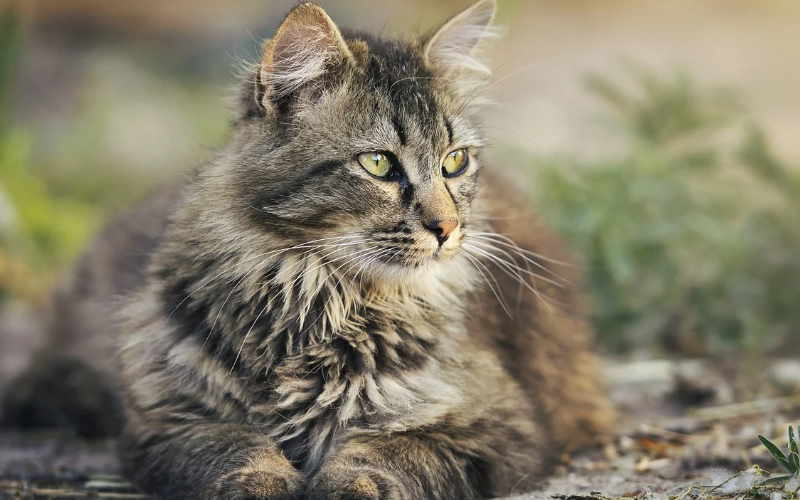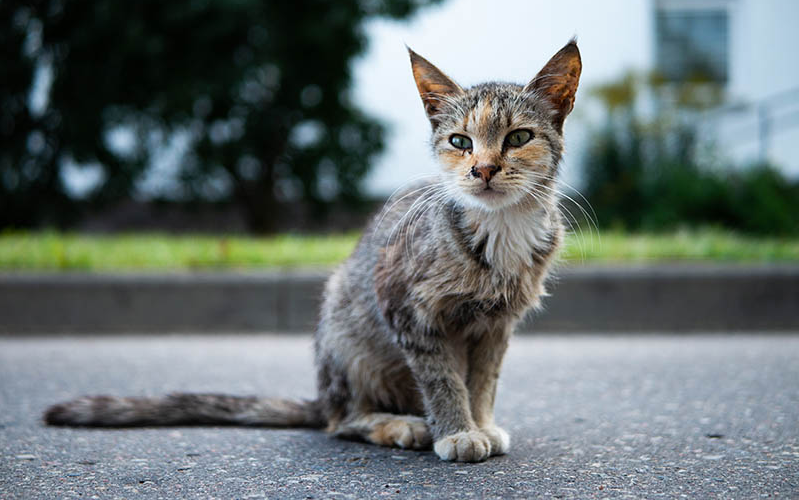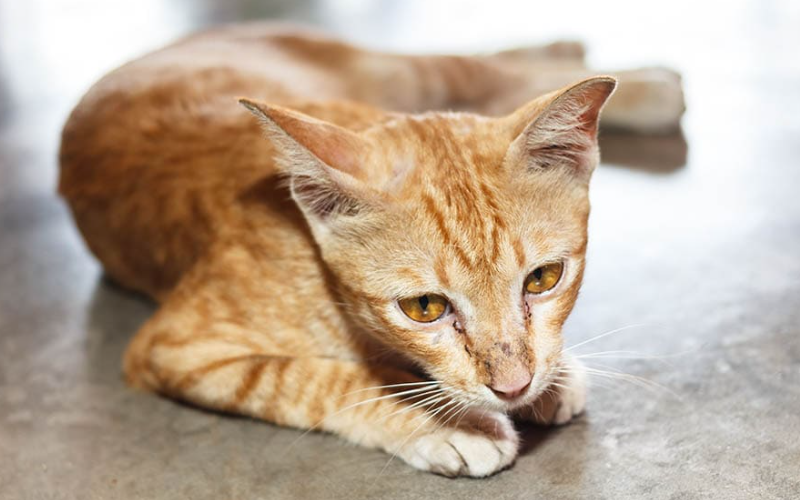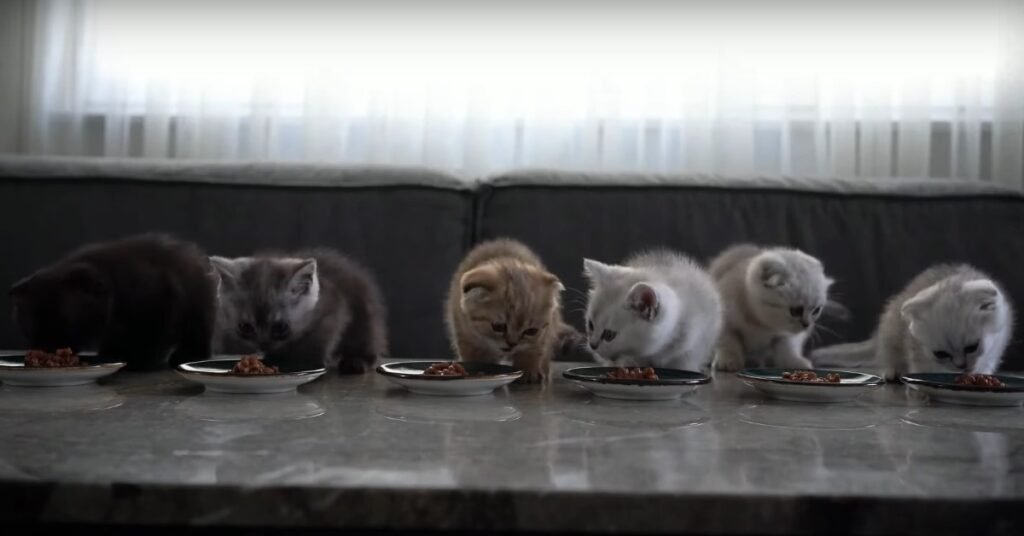
Senior cats often face weight-related challenges that younger cats do not. Their metabolism slows down, and their activity levels drop. Excess weight can stress joints, while sudden weight loss may indicate an underlying illness. Both ends of the scale matter.
Studies show that more than 55% of cats in the U.S. are overweight or obese. For older cats, carrying extra weight increases the risk of diabetes, arthritis, and heart issues. On the other hand, unexpected weight loss can point to thyroid disease or kidney problems.
In this guide, I’ll show you how to help your senior cat lose weight safely and gently. You’ll learn 10 simple steps that support health, comfort, and quality of life.
Why do senior cats lose weight?
Senior cats often lose weight because of hidden health issues. The most common causes include hyperthyroidism, diabetes, kidney disease, and dental pain. Each of these conditions makes it harder for your cat to maintain a healthy body condition.
Studies show that nearly 60% of cats over age 10 will develop at least one chronic illness that can lead to weight loss. That’s why any sudden or unexplained change in body weight deserves a vet visit.
Not all weight loss is the same. Some cats slim down because of illness. Others lose weight as part of a safe, managed plan. The table below shows the difference.
| Unintentional Weight Loss | Healthy Weight Loss |
| Caused by disease or dental pain | Planned with a vet’s guidance |
| Happens quickly and unexpectedly | Slow and steady over months |
| Often leads to muscle loss | Preserves lean muscle mass |
| A cat may act tired, thirsty, or in pain | Cat stays active and playful |
Here’s the key: unexplained weight loss in older cats is never normal. Once your vet rules out medical problems, you can focus on safe steps to help your cat shed extra pounds.
How can you tell if your senior cat is overweight or underweight?
Weight changes in older cats can be tricky to spot. A fluffy coat often hides weight gain or loss. The best way to know is by checking your cat’s body condition.
You should feel your cat’s ribs with light pressure. Ribs that feel like a washboard mean underweight. Ribs that feel buried under padding mean overweight. A healthy senior cat should have a visible waistline and no sagging belly fat.
Signs of overweight cats:
- Struggles to groom or scratch
- Tires after short play sessions
- Belly sways while walking
Signs of underweight cats:
- Sharp bones are easy to feel
- Loss of muscle in the back or hips
- Sleeps more than usual
Studies suggest that over 55% of cats in the U.S. are overweight, while senior cats often hide being underweight because owners expect weight loss with age. Both extremes can shorten a cat’s life.
Cat Body Condition Score (BCS) Chart
| Score | Body Condition | What You See & Feel |
| 1/9 | Severely underweight | Ribs, spine, and hips are very sharp. No body fat. Muscle wasting. |
| 2/9 | Underweight | Ribs and spine are easy to see and feel. Very little fat. Waist is extreme. |
| 3/9 | Slightly underweight | Ribs are easy to feel with little fat. Clear waistline. |
| 4/9 | Lean but healthy | Ribs are easy to feel, thin, and fat cover. Waist visible from above. |
| 5/9 | Ideal weight | Ribs can be felt with gentle pressure. Slim waist and slight belly tuck. |
| 6/9 | Slightly overweight | Ribs are harder to feel under fat. Waist is not as clear. Belly hangs a little. |
| 7/9 | Overweight | Ribs are difficult to feel. Obvious belly fat. No waist. |
| 8/9 | Obese | Ribs are almost impossible to feel. Round body shape. Large belly pad. |
| 9/9 | Severely obese | Ribs never felt. Cat looks round with heavy fat deposits. |
A score of 3 or below means too thin, while 6 or above means overweight.
A body condition score (BCS) chart is the gold standard. Your vet uses it to check if your cat is too heavy, too thin, or just right. A score of 5 out of 9 means ideal weight.
How much weight should a senior cat lose per month?
Safe weight loss in cats is always slow. Senior cats should lose about 0.5% to 2% of their body weight each week. That equals about ½ to 1 pound over a month for most older cats.
Losing weight too fast can be dangerous. Cats that drop pounds quickly risk hepatic lipidosis, a serious liver condition. This happens when the body burns fat too quickly and overwhelms the liver.
Here’s a simple example:
- A 12-pound senior cat should lose no more than 0.5 pounds in a month.
- A 16-pound cat should lose no more than 0.75 pounds in a month.
Studies show cats that lose weight at a slow, steady pace are twice as likely to keep it off long-term.

How to help your senior cat lose weight: 10 simple tips
Weight loss in senior cats must be safe and gentle. Here are 10 proven ways that work.
1. Talk to your vet first
Your vet should always guide the plan. They will check for hidden illnesses and set a healthy weight goal.
2. Switch to senior cat food for weight loss
Senior cat food for weight loss is lower in calories but still nutrient-rich. Look for high protein and moderate fat to protect muscle.
3. Measure food portions carefully
Use a measuring cup or digital scale. Even a few extra kibbles a day can stall progress.
4. Create a consistent feeding schedule
Set regular mealtimes. Two to four small meals a day keep metabolism steady.
5. Encourage gentle play and exercise
Short play sessions with feather toys, lasers, or wand toys help burn calories. Adjust games if arthritis makes movement harder.
6. Use food puzzles and slow feeders
Puzzle feeders slow eating and keep the mind sharp. They also turn mealtime into exercise.
7. Limit high-calorie treats
Cut back on snacks like cheese or tuna packed in oil. Offer freeze-dried chicken or a piece of kibble from daily meals instead.
8. Add safe movement to daily life
Place perches at different heights. Add ramps or steps so climbing feels easier. Even walking from room to room helps.
9. Monitor weight weekly
Weigh your cat on a baby scale. Keep a notebook or app to track progress. Small changes add up.
10. Be patient and consistent
Senior cats lose weight more slowly than younger ones. Stay consistent. Celebrate every small win along the way.
See more: How to Help a Senior Cat Gain Weight: 7 Vet-Approved Tips
What are the benefits of healthy weight loss for senior cats?
Healthy weight loss gives older cats a new spark of life. Even a small drop in weight can make a big difference.
Main benefits include:
- Better mobility: Less strain on joints eases stiffness and arthritis pain.
- More energy: Cats move, play, and interact more when they feel lighter.
- Stronger immune system: Balanced weight helps the body fight illness.
- Lower disease risk: Obesity raises the chances of diabetes, heart disease, and liver trouble.
- Longer lifespan: Studies show healthy-weight cats live almost two years longer than overweight cats.
A cat that moves more easily and feels better will also bond more with you. That’s one of the most overlooked benefits of safe weight loss.
What challenges do senior cats face when losing weight?
Senior cats face unique hurdles during weight loss. Their bodies change with age, which makes the process slower.
Common challenges include:
- Slower metabolism: Older cats burn fewer calories, even at rest.
- Arthritis or stiffness: Pain makes play and exercise harder.
- Dental problems: Chewing dry food may cause discomfort, leading to picky eating.
- Behavioral habits: Cats that have been free-fed for years may resist meal schedules.
These challenges don’t mean weight loss is impossible. They just require adjustments. Softer food, gentle play, and smaller meal changes all help. Patience matters most.
What is the best type of senior cat food for weight loss?
Not all cat foods are equal. Senior cats need fewer calories but still require high-quality protein.
Look for these features:
- High protein, moderate fat: Maintains muscle while losing fat.
- Low-calorie, nutrient-rich: Provides vitamins and minerals without extra weight.
- Digestible ingredients: Gentle on aging kidneys and stomachs.
- Moist or wet options: Helps hydration and easier chewing if teeth are sensitive.
Popular options include specialized senior weight management formulas from trusted brands. Always introduce new food gradually to prevent stomach upset.
Tips to make your senior cat enjoy weight loss
Weight loss can be fun and stress-free for older cats. The key is gentle encouragement and variety.
- Use interactive toys: Wand toys, lasers, or soft balls make exercise playful.
- Offer small, frequent meals: Keeps hunger low and energy steady.
- Add wet food for flavor: Enhances taste and hydration.
- Rotate treats: Freeze-dried chicken or small pieces of kibble keep interest high.
- Create cozy feeding spots: Cats eat more comfortably in quiet, safe areas.
- Celebrate progress: Gentle petting and praise reinforce good habits.
Making the process enjoyable reduces stress. Happy cats are more likely to eat properly and stay active.
Can supplements or vitamins help with weight loss in older cats?
Supplements can support healthy weight loss, but are not a magic solution. Always check with your vet before adding anything.
- Omega-3s for joint health: Helps older cats move more comfortably, making exercise easier.
- Fiber for satiety: Keeps your cat feeling full between meals and may reduce overeating.
- Vet guidance only: Some supplements can interfere with medications or worsen health issues.
Using the right supplements alongside diet and exercise can make weight loss safer and more effective for senior cats.

How do you know if your senior cat’s weight loss is unhealthy?
Some weight loss is normal, but sudden or drastic changes can signal problems. Watch for these red flags:
- Rapid or unexplained weight loss
- Loss of muscle tone or weakness
- Frequent vomiting or diarrhea
- Excessive thirst or urination
Call your vet immediately if you notice any of these signs. Early detection of health issues can prevent serious complications.
How long does it take for a senior cat to lose weight safely?
Safe weight loss in senior cats takes time. Most cats lose weight gradually over several months.
Consistency matters more than speed. Small, steady progress prevents stress on organs and reduces the risk of hepatic lipidosis. Track portions, playtime, and weekly weight measurements to stay on target.
FAQs:
1. At what age is a cat considered a senior?
Most cats are considered seniors at around 10 years old. At this stage, their bodies slow down, and age-related changes like reduced mobility or appetite shifts may appear. Many vets also classify cats 7–10 years as mature adults and 11–14 years as true seniors.
2. What is the 3-3-3 rule of cats?
The 3-3-3 rule explains how cats adjust after moving into a new home. In the first 3 days, many cats feel stressed and may hide or avoid contact. After 3 weeks, they start learning routines and building trust, and by 3 months, most cats feel secure, relaxed, and fully part of the family.
3. What is the life expectancy of a cat?
Most cats live between 12 and 16 years, though many reach their late teens. Indoor cats often live longer than outdoor cats because they face fewer risks. With good care, regular vet visits, and a healthy weight, some cats even live past 20 years.
4. What is the golden rule for cats?
The golden rule for cats is simple: never let them lose weight too quickly. Rapid weight loss can trigger hepatic lipidosis, a dangerous and often life-threatening liver disease. Safe, steady progress under a vet’s guidance is always the healthiest path.
5. How long does it take a cat to bond with you?
The time it takes for a cat to bond with you depends on their age, past experiences, and personality. Some cats may trust within days, while others need weeks or even months to feel safe. Patience, gentle interaction, and consistency help build a strong bond at the pace your cat chooses.
6. Why is my old cat suddenly so skinny?
Sudden weight loss in older cats is often linked to hidden health problems like kidney disease, hyperthyroidism, or diabetes. Dental pain and cancer can also cause loss of appetite and rapid weight changes. A quick vet visit is the safest way to find the cause and protect your cat’s health.
7. Is it normal for an old cat to get skinny?
It is not normal for an old cat to become skinny without a reason. Most senior cats lose weight because of health issues like hyperthyroidism, kidney disease, or diabetes. Any sudden or unexplained weight loss should always be checked by a vet to rule out illness and keep your cat safe.
8. Why do old cats get bony?
Older cats often get bony because they lose muscle mass with age. Illnesses like kidney disease, hyperthyroidism, or diabetes can also cause sudden weight and muscle loss. A bony body in a senior cat is usually a sign that it’s time for a vet check.
9. How to tell if a cat is coming to the end of life?
A senior cat nearing the end of life often shows clear changes in behavior and body. They may sleep more, eat less, and lose interest in favorite activities. Their breathing can become irregular, weight drops steadily, and mobility slows. Eyes may appear dull, and grooming decreases, leaving a rough coat. Some cats seek extra attention, while others hide quietly. Pain or discomfort can become more noticeable, and they may struggle to move or use the litter box. These signs signal it’s time for a vet check to ensure comfort and support.
10. How to discipline a cat?
Disciplining a cat means guiding, not punishing. I redirect unwanted behavior by offering alternatives and gentle corrections. Consistency, patience, and positive reinforcement teach them what is safe and acceptable.
Helping your senior cat lose weight safely
Weight loss in older cats takes patience, care, and consistency. Small changes in diet, exercise, and daily routines can make a big difference.
Track your cat’s progress, celebrate small victories, and adjust as needed with your vet’s guidance. Using senior cat food for weight loss, measured portions, gentle play, and optional supplements creates a safe plan.
Remember, slow and steady wins the race. A healthy weight improves mobility, energy, and overall quality of life. Your senior cat can thrive and enjoy more active, happy years with your support.

